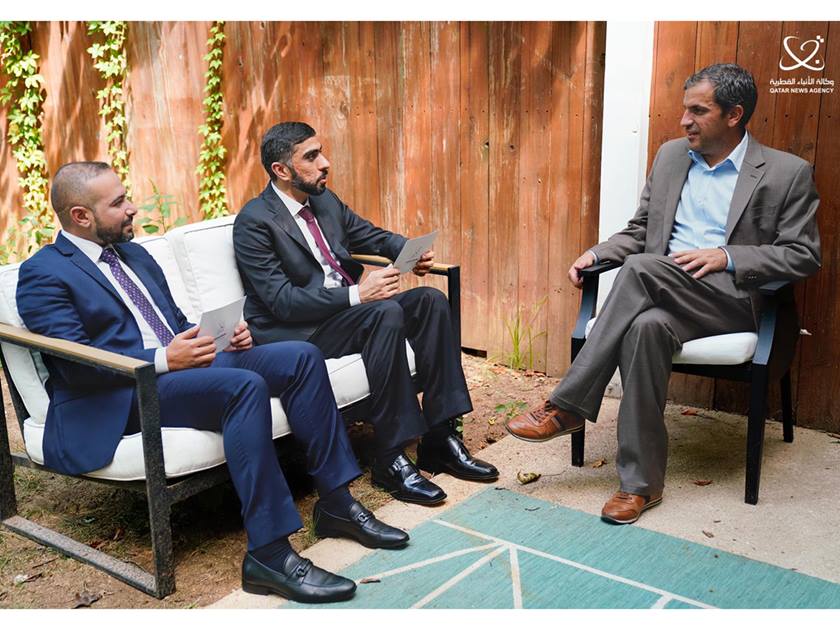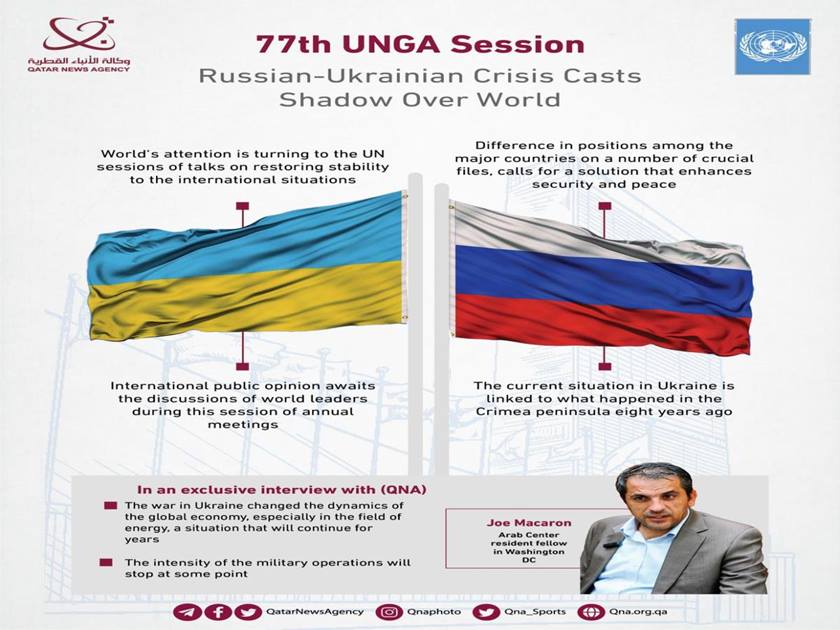New York, September 16 (QNA) - The 77th session of the United Nations General Assembly (UNGA) convenes with many swift geopolitical transformations and shifts on the world stage in various regions. International tensions are escalating, and so is the revival of the cold war’s "polarity" dynamic in world politics, brought back by the Russian military operation in Ukraine. In addition to the divergent positions among the major powers on many crucial topics, with each power having its own bets: something that requires finding solutions in order to preserve international peace and security.
International public opinion eagerly awaits the discussions of world leaders during this annual session, to see what consensus and compromises those leaders will be able to arrive to, in order to reduce the high costs of these topics repercussions, with the situation in Ukraine being in the forefront, after it had "disastrous" effects on supply chains, global food security, and energy prices. Not to mention levels of global inflation and growth, the increased tensions in various major commercial shipping lanes, be it in the Pacific and Indian Oceans or in northern Europe and Asia. All this is burdening countries economic performances, already hit by the repercussions of the COVID-19 pandemic since the year 2020.
Moreover, the attention of the world is set at the United Nations Headquarters in New York, in hopes of restoring world stability and avoiding the worst. Matters are already dire, especially in light of the expanding circle of economic difficulties and security challenges with no exceptions, rich or developing countries alike. This makes the need to find solutions to those issues ever more urgent.
It is expected that the UN member states will vote Friday on making an exception to allow Ukrainian President Volodymyr Zelensky to address next week's General Assembly by video.
Meanwhile Russia affirmed that Russian Foreign Minister Sergey Lavrov will participate in the meetings of UN General Assembly in New York. Lavrov Spokeswoman Maria Zakharov said in Moscow that so far, there have been about 20 requests for meetings with the minister.
The Russian-Ukrainian crisis, despite its negative effects on a variety of aspects in international relations, won’t be the only issue that requires world leaders to settle, so the world avoid a worse future, even if that means making difficult concessions.
After seven months without a solution to the Russian-Ukrainian crisis, the world is in dire need for a way out to restore some of the stability it lost since the start of the COVID-19 pandemic, and which deteriorated further with Moscow launching its military operations against Kyiv. State officials find themselves in a situation where it is necessary to silence the guns of that caused disruption of grain, oil and energy supply chains, resulting in spikes in food prices on the international markets.
Joe Macaron, an analyst at the Arab Center in Washington (ACW) confirmed in statements to Qatar News Agency (QNA), that the war in Ukraine has overshadowed events in the region, and affected many political and strategic calculations, through its repercussions on the global economy, energy prices, and food security. Therefore, it will take over the debates of the United Nations General Assembly this year and the side meetings.
On whether Western sanctions on Moscow will be useful, Macaron said that the United States does not want to go to war or have a confrontation with Russia; thus, it is imposing sanctions on Russia and creating a compelling international environment that would hopefully force Russia to reconsider its conduct. Moreover, Macaron remarked that sanctions are not always an effective weapon. Rather, it is the people of the sanctioned country who pay the price.
Furthermore, he added that Russia has already begun to adapt to the shifting situation, looking for new resources, and is thinking in a different way, away from traditional lenses. In fact, Russia is currently looking for new partners in China and India, which will change the nature of its relationship with the West. Likewise, the Europeans are also exploring ways to reduce their energy dependence on Russia.
The ACW Analyst also pointed out that the war in Ukraine has changed the dynamics of the global economy, especially in the field of energy, resulting in a situation that will continue for years. Macaron further expressed his belief that the war may be prolonged. However, Russia may reduce the intensity of its operations if it manages to capture the Ukrainian coast. In fact, Moscow believed that the war would be fairly easy and could be concluded quickly. Yet, the topography of the territory, as well as the Western support for Ukraine made achieving that goal difficult.
Moreover, Macaron believed that the intensity of operations will stop at some point, but the biggest challenge will be the exit strategy from Ukraine. He expressed his assessment that Russia will not withdraw from all Ukrainian territory, which will bring about a cold political war. Indeed, it is not yet possible to imagine the situation that Ukraine will be in after the war, and whether it will preserve its territorial integrity or not, he said.
Furthermore, in response to a question about whether the war in Ukraine could lead in one way or another to a confrontation between Russia and the United States, Macaron stressed that Russia and America are not in a direct confrontation in Ukraine, and it is not in their interest to enter a confrontation since the US does not want it and Russia does not want to add another front. In addition, he elaborated that although Russian-American relations are complex and tense, they did not reach the point that would lead them to direct confrontation.
As for whether the General Assembly upcoming session represents a favorable opportunity for the international community to deal with current issues be it the Russian-Ukrainian war, or the Iran nuclear program, Joe Macaron said that the General Assembly is like a forum in which discussions take place, yet it does not have the authority to take binding decisions. For such serious issues, the main decision-making body is the UN Security Council. However, the Council is stalled as a result of the American and Russian veto for decades. Thus, the General Assembly has no power, except to vote on some symbolic issues. In fact, even if it takes decisions unanimously, it does not have the authority to execute them. As a result, this session remains an opportunity to meet, discuss and exchange views, yet it cannot yield and decisions, according to United Nations law.
Moreover, observers believe that the solution to the Russian-Ukrainian crisis depends on complex factors, including the Kremlin's interpretation of the security situation on Russia's borders with northern European countries, especially in light of the expansion of the North Atlantic Treaty Organization (NATO) towards countries bordering Russia. With the other factor being the geostrategic situation in the land areas that Russia wants to be part of its own strategic space, far from the ambitions of the West and Washington.
The same observers link the current situation in Ukraine with what happened in Crimea eight years ago when Moscow reclaimed some areas that were under the rule of Kyiv, rendering the current military operation as a new chapter in the Russian desire to restore lands that were previously part of the Soviet Union before its dissolution at the end of 1991.
Furthermore, observers say that the Russian military’s delay in achieving its military operations objectives against its neighbor will prevent reaching a settlement to end the longest war in Europe in decades. This means prolonged violent confrontations. In turn, this opens the door wide before several possible scenarios for the crisis; the first of which is transforming this war into a long war of attrition, causing additional major losses. In fact, Russian President Vladimir Putin stated earlier that he will win the confrontations by showing "strategic patience", betting on Western countries eventual feeling of "Ukraine fatigue", leading them to focus more on their economic crises and the Chinese threat. Therefore, the West would continue to supply Ukraine with weapons, in order to create quasi-fixed frontlines, turning the military operation into a permanent conflict with low intensity, yet this conflict may extend for an unknown duration.
In contrast, analysts do not rule out that the Russian President Vladimir Putin surprises the international public opinion with a unilateral ceasefire, as a result of being satisfied with the gains already achieved on the ground, which is a step that would be rejected by western powers especially the US, the UK, as well as Eastern European countries due to their insistence on the Russian departure from all Ukrainian lands.
Moreover, among the anticipated scenarios is that Moscow and Kyiv’s shift courses and hold peace talks. Yet, Ukraine's mistrust of Russia may not support any peace agreement, leading to a new chapter of confrontations whose results may be more detrimental on both countries.
In the midst of the current international reality, analysts stress that ensuring the safe passage of commercial, oil and food shipments in the various international waterways has become one of the major issues that require a global consensus and a continuous commitment due to this issues direct and rapid impact on global food supply chains and security, as well as on the growth rates of countries’ economies, and on the interests of world populations.
Additionally, another major and urgent topic to be brought up during the 77th United Nations General Assembly meeting will be the volatile global security situation and reducing bilateral and collective tensions. Thus, bringing opponents to the negotiating table to resolve their issues that have long aroused international opinion. A case in point would be the Iranian nuclear dossier and the return to the 2015 agreement between Tehran and the P5+1 Group, the Sino-American dispute, the situation on the Korean peninsula between Seoul and Pyongyang, as well as sending more support and reinforcement to the African Sahel region.
Moreover, the Palestinian issue will be one of the most important items for world leaders to discuss, given the continuous expansion of Israeli settlements in the occupied West Bank, and the high rate of Israeli escalations against the Palestinian people, an example of which is the recent aggression launched by the Israeli entity on the Gaza Strip, leaving behind dozens of martyrs, hundreds of wounded and material losses estimated at billions of dollars.
The overlapping parties in the Palestinian issue will discuss, during their participation in the work of the UNGA 77th session, the viable possibilities to embody the principle of the two-state solution, especially after US President Joe Biden confirmed during his recent visit to the occupied territories, and his meeting with Palestinian President Mahmoud Abbas, his administration's adherence to finding a solution to the Palestinian question.
Furthermore, climate change and global warming will be no less important than the rest of the major issues on the discussion table, as there is an alarming increase in the rates of fires, floods and droughts in various regions of the world, which prompted world capitals to call for action to materialize the recommendations of the Paris Climate Conference whose objectives is to reduce the level of greenhouse gas emissions, as well as reduce the atmospheres temperature by one and a half degrees Celsius.
Finally, the slowdown in global economic growth, during this and next year, and the spread of indebtedness and proliferation of poverty, will constitute a significant item on the agenda of the UNGA. Hopes are high that world leadership will push towards devising solutions to these obstacles that hinder the restoration of economic, commercial and development mobilities that lost their luster since the start of the pandemic in the first quarter of 2020. (QNA)
16 September 2022
77th UNGA Session: Russian-Ukrainian Crisis Casts Shadow Over World
Keywords
General, International, United Nations, General assembly
News Bulletins
Most Read



